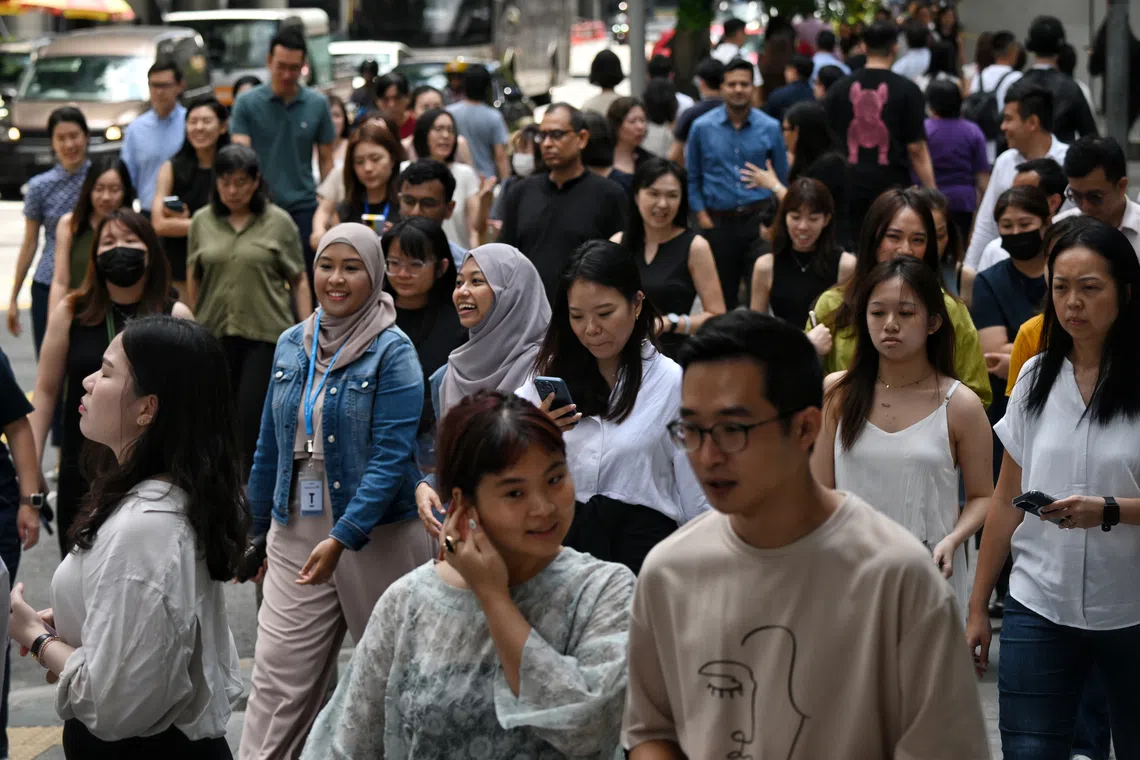MPs seek deeper support for S’porean workers and home-grown businesses
Sign up now: Get ST's newsletters delivered to your inbox

Proposals to help the Republic’s job seekers and SMEs rounded out five days of debate.
PHOTO: ST FILE
- MPs debated strengthening Singapore's workforce and supporting local enterprises, including an AI traineeship scheme by e2i to help SMEs automate.
- Concerns were raised on high rental bids for heartland shops, and the need for stronger labour laws to enhance job security and the certainty of retrenchment payouts.
- The Workers' Party called for greater government transparency, while other MPs highlighted support for aspiring parents at work.
AI generated
SINGAPORE - Strengthening Singapore’s workforce and supporting local enterprises was a theme shared by several of the 12 MPs who spoke on Sept 26, the final day of the debate on the President’s Address.
Proposals to help the Republic’s job seekers and small and medium-sized enterprises (SMEs) rounded out five days of debate, which saw 81 MPs join the week-long discussion on the Government’s upcoming plans. Those who had spoken included all 32 new MPs.
Senior Minister Lee Hsien Loong said at the close of the debate that MPs had put forth many suggestions, covering issues that matter to Singaporeans.
“Stewarding Singapore is a sacred duty, and I am encouraged to see our freshmen MPs speaking out on issues close to their hearts,” he said in a Facebook post.
MPs who spoke up for young workers included Ms Poh Li San (Sembawang West) and Ms Hazlina Abdul Halim (East Coast GRC).
Ms Poh proposed a new artificial intelligence (AI) traineeship scheme, where NTUC’s Employment and Employability Institute (e2i) works with training firms to run courses for job seekers.
After two to four weeks of picking up AI tools, e2i can match these “AI change agents” with SMEs keen to automate their business processes.
She suggested that the Government subsidise 70 per cent to 80 per cent of the salaries of these change agents for up to six months, with further salary support for up to one year if the company converts them to permanent staff.
Ms Hazlina also called for better support for employers who successfully upskill their trainees and help them secure full-time employment at the end of their traineeship, such as under the new Graduate Industry Traineeships scheme.
WP MP Kenneth Tiong (Aljunied GRC) called on the Government to build “inherent capacity” in Singapore by encouraging the development of a high-value, local base of companies and industries.
He cited the example of Airbus, a transnational consortium which managed to preserve the aviation industries of European countries in the face of tough competition by American giants like Boeing.
“High-value work, hosted on our shores, can be repatriated at any time, leaving our workers exposed,” he said.
He said the ultimate defence for Singaporean workers is being part of a deep industrial ecosystem, and urged the Republic to champion the creation of new “Airbus-style” commercial consortiums with willing regional partners.
Mr Liang Eng Hwa (Bukit Panjang) raised concerns over extremely high bids for heartland shop spaces, such as the $52,000 bid
The price-quality method – which evaluates tenders based on both price and quality factors – and price reasonableness assessment are necessary interventions to rein in runaway rental bids, he said. Increasing the supply of retail spaces in the heartland in locations where rental bids are high may also help, he added.
Mr Liang also revisited his proposal to increase the Fair Consideration Framework
Job security was also raised by Mr Vikram Nair (Sembawang GRC), who sought stronger labour laws.
He asked the Government to consider legislating redundancy and retirement benefits, which will incentivise a longer-term relationship between employers and employees. This will hopefully give workers more employment security, and some guarantee of a payout should they lose their job.
Ms Hany Soh (Marsiling-Yew Tee GRC) highlighted the need for more support for aspiring parents at the workplace, with the country’s resident total fertility rate
She asked employers to review their existing fertility support policies, as this could make or break a worker’s efforts to conceive.
A progressive stance can even be a talent magnet for companies, she added.
Ms Sylvia Lim (Aljunied GRC) said elected MPs have a duty to speak for their constituents and hold the Government to account, regardless of party affiliations.
The WP chairwoman said the Government should always demonstrate that it is sharing as much information as possible, repeating a call that was also made by other WP MPs.
Wrapping up the debate, Mr Sharael Taha (Pasir Ris-Changi GRC) said that MPs’ speeches over the five days showed there was consensus in the House on the need to transform Singapore’s economy, whether on the jobs front, in education, or on social safety nets.
“We must be ready to pivot, ready to adapt and ready to transform as circumstances evolve – our survival depends on staying agile, nimble and ever ready to renew ourselves,” he said.
“This acceptance of constant transformation is not optional; it is the very foundation of Singapore’s survival and progress.”



